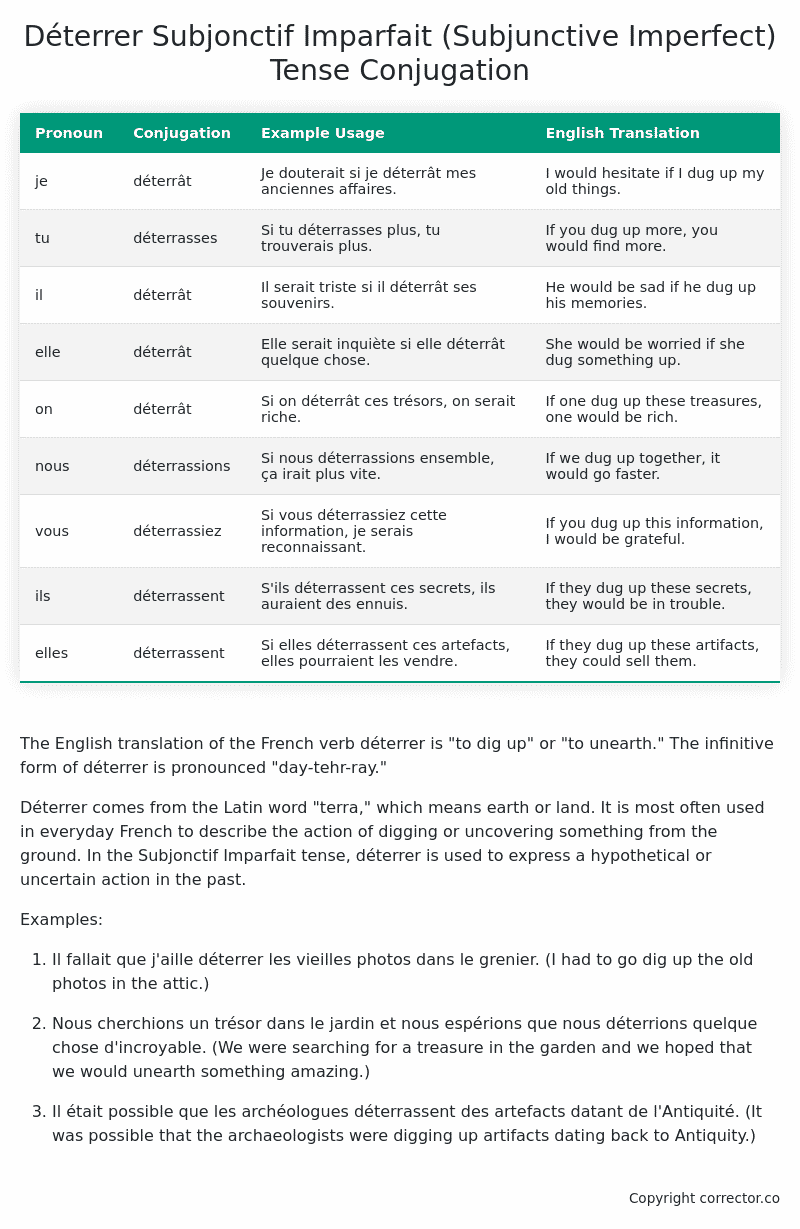Subjonctif Imparfait (Subjunctive Imperfect) Tense Conjugation of the French Verb déterrer
Introduction to the verb déterrer
The English translation of the French verb déterrer is “to dig up” or “to unearth.” The infinitive form of déterrer is pronounced “day-tehr-ray.”
Déterrer comes from the Latin word “terra,” which means earth or land. It is most often used in everyday French to describe the action of digging or uncovering something from the ground. In the Subjonctif Imparfait tense, déterrer is used to express a hypothetical or uncertain action in the past.
Examples:
-
Il fallait que j’aille déterrer les vieilles photos dans le grenier. (I had to go dig up the old photos in the attic.)
-
Nous cherchions un trésor dans le jardin et nous espérions que nous déterrions quelque chose d’incroyable. (We were searching for a treasure in the garden and we hoped that we would unearth something amazing.)
-
Il était possible que les archéologues déterrassent des artefacts datant de l’Antiquité. (It was possible that the archaeologists were digging up artifacts dating back to Antiquity.)
Table of the Subjonctif Imparfait (Subjunctive Imperfect) Tense Conjugation of déterrer
| Pronoun | Conjugation | Example Usage | English Translation |
|---|---|---|---|
| je | déterrât | Je douterait si je déterrât mes anciennes affaires. | I would hesitate if I dug up my old things. |
| tu | déterrasses | Si tu déterrasses plus, tu trouverais plus. | If you dug up more, you would find more. |
| il | déterrât | Il serait triste si il déterrât ses souvenirs. | He would be sad if he dug up his memories. |
| elle | déterrât | Elle serait inquiète si elle déterrât quelque chose. | She would be worried if she dug something up. |
| on | déterrât | Si on déterrât ces trésors, on serait riche. | If one dug up these treasures, one would be rich. |
| nous | déterrassions | Si nous déterrassions ensemble, ça irait plus vite. | If we dug up together, it would go faster. |
| vous | déterrassiez | Si vous déterrassiez cette information, je serais reconnaissant. | If you dug up this information, I would be grateful. |
| ils | déterrassent | S’ils déterrassent ces secrets, ils auraient des ennuis. | If they dug up these secrets, they would be in trouble. |
| elles | déterrassent | Si elles déterrassent ces artefacts, elles pourraient les vendre. | If they dug up these artifacts, they could sell them. |
Other Conjugations for Déterrer.
Le Present (Present Tense) Conjugation of the French Verb déterrer
Imparfait (Imperfect) Tense Conjugation of the French Verb déterrer
Passé Simple (Simple Past) Tense Conjugation of the French Verb déterrer
Passé Composé (Present Perfect) Tense Conjugation of the French Verb déterrer
Futur Simple (Simple Future) Tense Conjugation of the French Verb déterrer
Futur Proche (Near Future) Tense Conjugation of the French Verb déterrer
Plus-que-parfait (Pluperfect) Tense Conjugation of the French Verb déterrer
Passé Antérieur (Past Anterior) Tense Conjugation of the French Verb déterrer
Futur Antérieur (Future Anterior) Tense Conjugation of the French Verb déterrer
Subjonctif Présent (Subjunctive Present) Tense Conjugation of the French Verb déterrer
Subjonctif Passé (Subjunctive Past) Tense Conjugation of the French Verb déterrer
Subjonctif Imparfait (Subjunctive Imperfect) Tense Conjugation of the French Verb déterrer (this article)
Subjonctif Plus-que-parfait (Subjunctive Pluperfect) Tense Conjugation of the French Verb déterrer
Conditionnel Présent (Conditional Present) Tense Conjugation of the French Verb déterrer
Conditionnel Passé (Conditional Past) Tense Conjugation of the French Verb déterrer
L’impératif Présent (Imperative Present) Tense Conjugation of the French Verb déterrer
L’infinitif Présent (Infinitive Present) Tense Conjugation of the French Verb déterrer
Struggling with French verbs or the language in general? Why not use our free French Grammar Checker – no registration required!
Get a FREE Download Study Sheet of this Conjugation 🔥
Simply right click the image below, click “save image” and get your free reference for the déterrer Subjonctif Imparfait tense conjugation!

Déterrer – About the French Subjonctif Imparfait (Subjunctive Imperfect) Tense
Formation
Common Everyday Usage Patterns
Interactions with Other Tenses
Subjonctif Présent
Indicatif Passé Composé
Conditional
Conditional Perfect
Summary
I hope you enjoyed this article on the verb déterrer. Still in a learning mood? Check out another TOTALLY random French verb conjugation!


